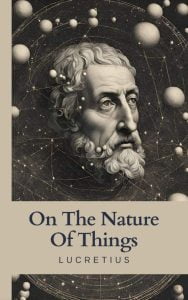On The Nature Of Things by Lucretius

Download and Enjoy On The Nature Of Things by Lucretius
Thank you for your interest in downloading On The Nature Of Things by Lucretius. Please find the free ebook versions below.
About this Public Domain Book
This full text of On The Nature Of Things has entered the public domain in the UK and is now freely available. It may be reproduced, distributed, or transmitted without any restrictions. We are providing it for free distribution and use by individuals for non-commercial purposes. Please note that the copyright status in other countries may vary, so it is advisable to check the copyright laws of your specific jurisdiction before reproducing, distributing, or transmitting the text.
Download On The Nature Of Things by Lucretius As A Free Ebook
You can download this book in two common ebook formats:
- EPUB format - compatible with most e-readers like Kindle, iPad, Nook, etc.
- PDF format - useful for printing or viewing on any device
First published: 99 - 55BC
Number of Words: 75,000
Avg. Time to Read: 5 - 7 hours
Translator: William Ellery Leonard
Description:
Lucretius was a Roman poet and philosopher who lived during the first century BCE. His great poetic work “On the Nature of Things” outlined the philosophical system of Epicureanism through didactic verse.
Central to Lucretius’ Epicurean worldview was the idea that the universe was solely comprised of tiny physical particles called atoms moving through empty void. He felt that superstitions arose from humanity’s fear of various unfathomable phenomena like earthquakes and disease. By explaining natural events through rational principles like atomic theory, Lucretius sought to liberate people from such irrational fears. His poetic language brought philosophical concepts like atomic motion and void to vivid life in a way that appealed to both intellectuals and a wider Latin-reading audience.
Through six books of compelling poetic argumentation, Lucretius discussed physics, human psychology, ethics, and more through an Epicurean lens. He covered topics like sensation and thought, the formation of the world and humans, death and the soul, magnets and lightning, sex, dreams, disease and its cure. The work was both a lengthy didactic poem promoting Epicurean philosophy, as well as a breathtaking evocation of how an atomic universe according to natural principles could beautifully give rise to our world and everything in it. Centuries later, “On the Nature of Things” remains one of the most influential literary works ever written about science, religion, and philosophy.
Download:
Need Help Loading the Book onto Your Device?
If you encounter any issues while loading the book onto your device, check out our guide on loading books from 250 WPM onto your device.
